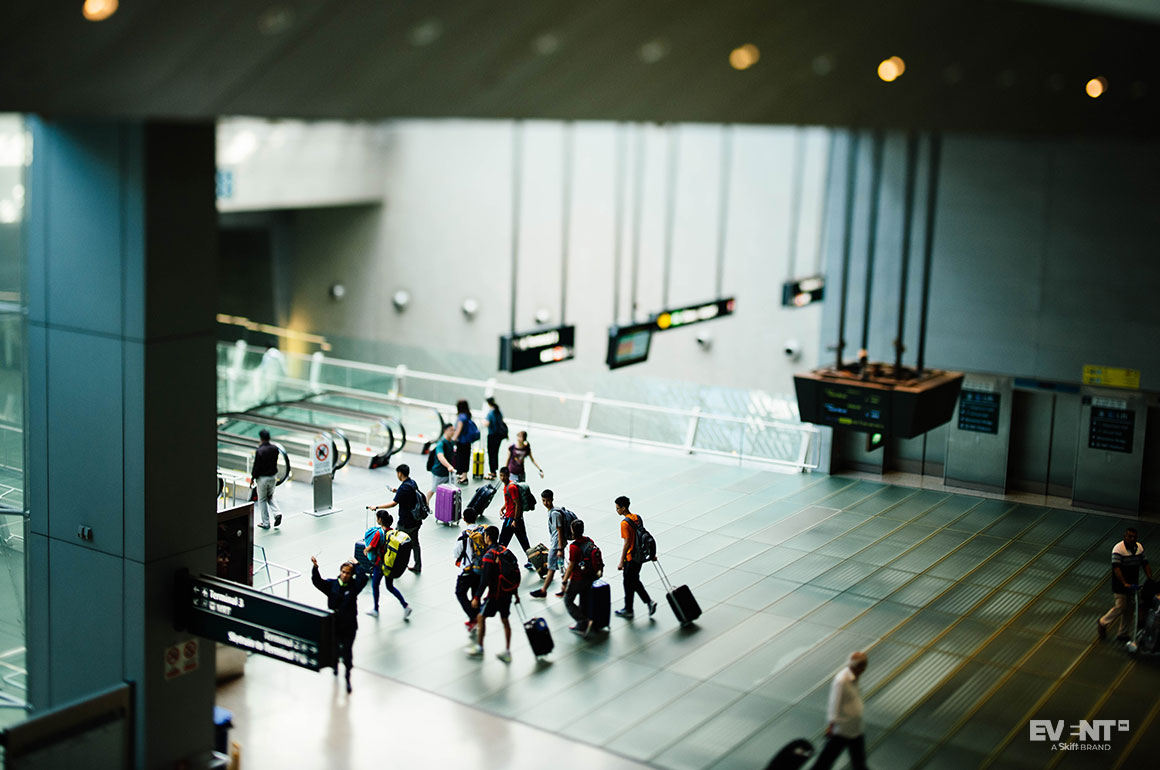Skift Take
Could successful vaccine rollouts in countries with strong domestic markets for trade shows and other events put a damper on resuming international events? While event executives are optimistic about a rebound in international travel, they also see factors favoring a greater shift toward local and regional events.
How will successful vaccine rollouts in countries with strong domestic markets impact decisions to once again hold or attend international events? Is there likely to be a significant and possibly lasting shift toward local or regional conferences and trade shows and away from those on a global scale?
Event industry executives who spoke with EventMB have a mixed outlook on how quickly international event business will come back. While they are optimistic about pent-up desire for international travel, including for events and incentive programs, they also note significant roadblocks, including hesitation among some companies to resume long-haul business travel and concerns about how various destinations overseas are handling Covid-related factors.
Safety Issues
Which event destinations are likely to fare best in once again attracting international business? While vaccine progress is an important consideration, it’s far from the only one driving overseas site decisions, according to Kai Hattendorf, managing director and CEO of UFI.
Among other important issues are how open a destination is on its borders and what travel requirements are imposed on attendees by their countries of origin.
“Let’s say you go to Singapore from China, because Singapore lets you in, but then you have to quarantine for weeks upon your return as a requirement for everyone returning from outside of China. That doesn’t speak in favor of or against Singapore as a destination. It’s a regulation of the country of origin of the participant. So I think the picture is much more complex.”
– Kai Hattendorf, Managing Director and CEO, UFI
Hattendorf noted that countries are exercising different approaches to reopening for international travel, essentially driven by the health regulations onsite at the destination as well as by the culture and the politics. In choosing a destination, he said the key is to examine how friendly the government or society is toward events.
“If they are known to be [friendly], they will find a solution to run events while keeping people safe,” he said. “So I think it has a lot to do with the positioning and the priority of business events as a tool for economic recovery.”
London is among destinations seeking to build confidence for international events, including addressing the concerns of event planners, according to Joshua Novick the vice president of North American business tourism for London & Partners.
“We certainly get questions, and we do our best to answer them,” he said. “We’re advising event planners to keep them updated as the government releases new restrictions. We make sure that they’re aware.”
Novick said London is seeing some progress, with events such as FinTech Week happening this month and two NFL games on tap for October.
“We’re seeing a commitment from international entities into London,” he said. “And at the same time, the government’s running pilot events — schemes where different protocols are in place to monitor infection rates as well as track and trace situations that kind of all play into the policy that will ultimately be put in place.”
Will some destinations attract international events away from competitors by positioning themselves as safe destinations in the Covid era? According to Hattendorf, it’s an open question, noting that trade shows in particular tend to stick to certain tried and true locations.
“Trade shows don’t really travel that easily. Most of them have a strong legacy at a certain destination. Looking back from 2025, the vast majority of shows will likely have gone through the pandemic (whether it ends a few months earlier or later) in one respective market with their schedule remaining tight and stable in that destination. I think conferences and congresses will flip more easily to other destinations, but every organizer will only take an event to a destination that serves the respective community or industry.”
– Kai Hattendorf, Managing Director and CEO, UFI
When it comes to decisions for corporate events, Novick said the U.K. has already benefited from being perceived as a safer choice than others. He noted that an incentive program originally scheduled for a cruise in the Mediterranean recently shifted to a split program in London and Scotland “because the U.K. was deemed a less risky destination.”
Going Local
However, with hesitations for overseas travel likely to persist, the industry executives said the trend for local and regional events, which was happening even before the pandemic, will intensify.
Trade shows, in particular, will reflect this trend, said Hattendorf.
“The general projection is that global leading shows will break down into a number of regional leading shows,” he said. “Because travel will remain impacted for the next year, you’ll have a flagship show in Europe, one in Asia, and one in the Americas rather than one flagship show globally. So that may fast track this geocloning trend and the regionalization trend we’ve seen on the trade show side before.”
On the hotel level, targeting local and regional business may become a higher priority. It has already happened with Magnuson Hotels, where chief executive officer Thomas Magnuson said the importance of the local sector became evident during the pandemic when housing essential services workers kept his properties afloat.
“We began a corporate strategy to focus on the non-leisure sector — not so much for large-scale events in a primary market such as in Orlando or Vegas or New York City, but rather a foundational backbone of local and regional non-leisure,” he said.
“This goes really back to everything I’ve ever known about hotels. When you run a hotel, the most important thing one needs to do is start their marketing close to home. One needs to build a 52-week foundation of local and regional non-leisure sectors. And by that, what I mean is focusing on very sustainable segments: government education, public safety, transportation, medical. These are the sectors that are invisible, but they travel 52 weeks a year.”
However, the strategy may not work for all hotels, particularly large convention-style properties, Magnuson added.
“I don’t know if some of the larger competitors can retrofit their strategy to the strategy of the local regional market that we’re driving,” he said.
Help From Hybrid
When it comes to the return of international business, hybrid events may lead the way. Novick said hybrid meetings, particularly those simultaneously using facilities in London and New York, hold promise for jump starting global events.
“We’re hosting one during Tech Week in September which will be hybrid,” he said. “So that’s something that we’re looking for in the interim to foster connections, even if people are unable to travel in the short-term. I don’t think anyone is relying on it to be a long-term solution, but definitely in the short to medium term.”
For the long-term, Hattendorf sees the increasing use of digital technology at meetings as something that bodes well for in-person events on the national and international level.
“Digital event experiences drive the wish from people who haven’t been to a physical event to attend a physical event, and this is going to be a big game changer,” he said, citing data that shows this to be true for 70 percent of people who have been to a digital event on a digital platform.
“This brings a new audience to the physical space. Now this audience won’t necessarily be in the position to travel internationally because they’re on average more junior — they are the next generation of leaders — but for them, it’s perfect to have the opportunity to get face-to-face exposure when events are possible again on the national level. Every national level event today grooms the participants for the international levels tomorrow.”
International Outlook
While international travel is starting to come back, Magnuson believes it is likely to stay sluggish into 2022.
“We’re seeing some, and it’s good to see, but I wouldn’t say it’s strong,” he said. “There may need to be entirely new expectations set everywhere. As far as the meetings and conference bookings, we’re basing some of our thinking on the ‘back to office’ requirements or non-requirements set forth by some very large corporations. Apple just recently stated that they want people to come back to the office three days a week. They might only get two. What does that mean for the pre-existing levels of compulsory business travel and related group bookings such as for trade shows, meetings, and conventions?”
Of course, what happens with Covid in the months ahead will also be a major factor, he added.
“If there are not significant outbreaks after the summer travel and then Q4 infection rates continue to reduce, that would likely give a significant level of confidence to book and to travel for both the U.S and U.K.,” Magnuson said.
According to Novick, the number of bookings and RFPs coming to London hotels from the U.S. is starting to increase, particularly for dates in early 2022 and beyond. However, he notes that caution still prevails, especially among corporate clients.
“I think the biggest kind of setback or limitation, isn’t so much from uncertainty around travel, but it’s about the industries that we attract, which are largely finance, creative and the tech sector,” he said. “And I think they are very inwardly focused on duty of care to their employees and to their attendees. I think they’re all sort of waiting for one leader within the industry to take the plunge.”
Citing “a new level of flexibility,” Novick said planners will find that hotels and venues are ready and willing to address their concerns.
“They’re taking into account pandemic insurance and clauses that make it more accommodating because there is a level of uncertainty that none of us can control at the end of the day,” he said.
Also encouraging to Novick are recent findings from the Incentive Research Foundation that incentive programs are returning to international destinations.
“To me, that’s one natural step in the progression towards more international events,” he said.
Hattendorf is also optimistic, noting that feedback he’s received after recent international shows is showing “a strong urge of people to come back together.”
When it comes to the long-term outlook for international travel, Magnuson said there are positive indicators, although it may be quite different than in the past.
“Regardless of what’s happening right now, the overall international and domestic travel is growing at about four times the rate of the mature economy’s,” he said. Magnuson speculates that this could manifest in a lot more leisure travel and possibly a combination of business and leisure travel owing to the trend of mobile, remote working situations. “If you have to go on a business trip, you might add three or four extra days because you don’t have to be back in the office on Monday. The overall volume will continue to grow, but we’re all going to have to adapt to serve needs that we don’t particularly understand yet.”





